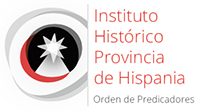Perfil humano de fray Pedro de Godoy, O.P.
Abstract
RESUMEN: Este trabajo aborda el estudio de la singular personalidad de Fray Pedro de Godoy, último representante de la Escuela de Salamanca. Fue un gran teólogo español cuya vida y obra también se analizan. La mayor parte del artículo intenta aproximarse al perfil humano del personaje en las tres etapas más importantes de su vida: En la Universidad de Salamanca, y en los obispados de Osma y Sigüenza. El resultado es una vida consagrada al estudio, la observancia religiosa y la comprensión de sus semejantes. Palabras clave: Teología, personalidad, obispados, catedrático, comprensión humana.
ABSTRACT. This work addresses the study of the unique personality of Friar Pedro de Godoy, last representative of the socalled School of Salamanca. He was a great Spanish theologo, whose life and work are also analyzed. Most of this article tries to approach the human profile of the character in the three most important stages of his life: In Salamanca University and in the bishoprics of Osma and Sigüenza. The result is a livelihood devoted to study, religious observance and understanding of others. Keywords: Theology, personality, bishopric, cathedratic, human understanding.
Downloads
Published
How to Cite
Issue
Section
License
Authors who publish with this journal agree to the following terms:
- Authors retain copyright.
- The texts published in this journal are – unless indicated otherwise – covered by the Creative Commons Spain Attribution 4.0 licence. You may copy, distribute, transmit and adapt the work, provided you attribute it (authorship, journal name, publisher) in the manner specified by the author(s) or licensor(s). The full text of the licence can be consulted here: https://creativecommons.org/licenses/by/4.0/.
- Authors are able to enter into separate, additional contractual arrangements for the non-exclusive distribution of the journal's published version of the work (e.g., post it to an institutional repository or publish it in a book), with an acknowledgement of its initial publication in this journal.
- Authors are permitted and encouraged to post their work online (e.g., in institutional repositories or on their website) prior to and during the submission process, as it can lead to productive exchanges, as well as earlier and greater citation of published work (See The Effect of Open Access).






